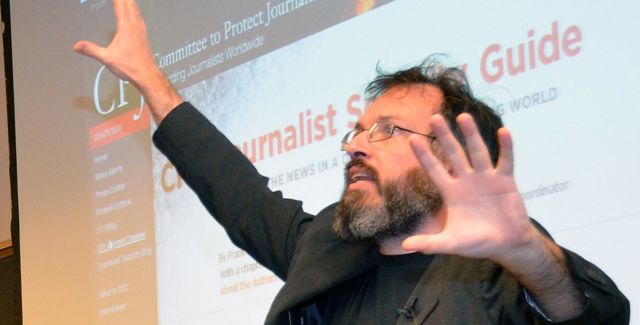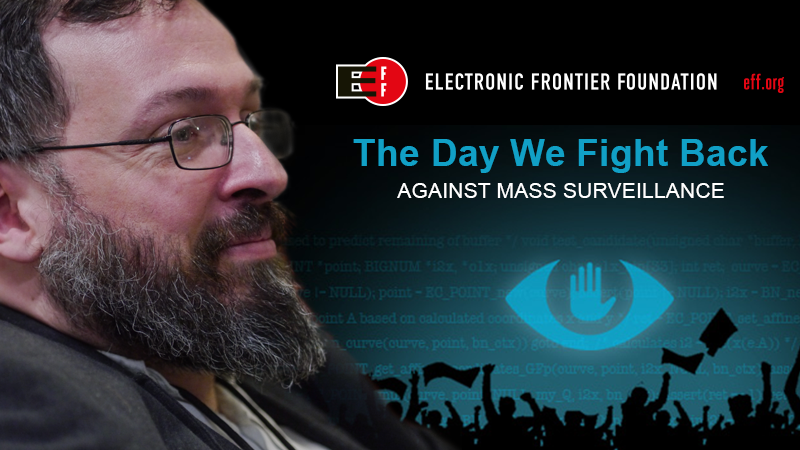On the subject of that giant copying machine, I’d also like to talk about your work with the Committee to Protect Journalists. With copying comes a papertrail – how does this affect journalists and their responsibilities to their sources?
One of the points we make is that journalists now have a responsibility to protect their sources. It’s still the case that in many countries there are legal protections especially for journalists to not reveal their sources, but again – and this is a side effect of how the internet works, and the ‘bucket brigade’ process over moving data around – when I send you an email it goes through three or different computers when it gets to you.
One of the consequences of that is that if a source is contacting you via the internet, or even via a phone, the government no longer has to come knocking on your door with a subpoena which you can challenge under free speech legislation or journalist shield protection, they can just go knocking on the phone company’s door or the ISPs door.
We’ve seen that in the US. The number of prosecutions of whistleblowers has mushroomed in the last few years primarily because the legal protections for journalists and sources are still on the books but they’re just not useful. The Department of Justice will subpoena all of the Associated Press’ phone records, for example, from their offices and they will go through it until they find a phone number linked to a likely source who they then prosecute.
We know a lot about the US and the process that prosecutors take to subpoena records and, thanks to Edward Snowden, how security services are collecting personal data online. Do you think people in African countries, and other developing countries, are aware of the extent to which their governments engage in the same practices and have laws on paper that give them these powers.
I’ve said this in a lot of meetings and have convened a meeting of African technologists and journalists in Silicon Valley to talk about this. In the same way that a lot of African countries leapfrogged a lot of the world when they skipped landline communications and went straight to mobile phones, there’s going to be this same moment again where people will be getting the majority of their media and internet consumption through mobile before other countries. There’s a vast spectrum of political systems across Africa. You have stable democracies, you have emerging democracies, you have countries that are actually quite repressive dictatorships – and across all of those types of societies, they’re all going to hit this mobile internet broadband revolution at roughly the same time.
Because it’s the mobile companies that are driving this, rather than governments?
Right – exactly. You do see in somewhere like Eritrea, where they worked hard to slow down the first mobile revolution, eventually they had to bow down to it because they were seeing huge economic growth directly as a result of their adoption of mobile technology. So it’s a very hard thing to prevent.
[symple_box style=”boxinfo”]
“Google doesn’t know that much about you unless you give them that information”
[/symple_box]
We at the EFF, and a lot of technologists like us who see the internet as – on balance – an ultimately liberating force and a power for human rights are really concerned about this because the mobile phone internet, intermediated by mobile phone companies, is a far more invasive and risky place than the traditional internet.
It used to be that “on the internet nobody knows you’re a dog”. Maybe the NSA has revealed that it is not really the case, that the NSA at least knows exactly what breed of dog you are on the internet. But the fact remains that on the fixed line internet you can do a pretty good job of protecting your identity, of choosing which companies you do business with online in order to select how much information you want to reveal to the world or how little.
Google is sometimes good and sometimes bad for privacy. But if you really feel that Google is messing with you, you can move provider to Microsoft or Yahoo! or so on.

Out of the frying pan, as they say…
Yes, but these companies are somewhat competing with each other and they do take a hit when it’s discovered that they’re doing something creepy. And also, Google doesn’t know that much about you unless you give them that information.
In the mobile phone world, there’s one company you’re dealing with. And that’s the mobile phone company. That mobile phone company knows who you are, because you had to show some ID when you bought that SIM, and they know what you’re looking at, because all of your internet traffic is going over their computers before it goes into the outside world. They know exactly where you are, because mobile phones are essentially tracking devices that, for as long as they are switched on are constantly reporting their physical location to the phone company.
And finally, they have control, most of the time, over your device. On the desktop, for example, there’s a limit as to what Google can do because Google cannot run software on my computer unless I permit it to. That’s not true on your mobile phone. You buy it from the phone company and they will send it updates.
And finally, most mobile phone companies have a very strong and intimate relationship with the local government. Google gives less of a hoot about what goes on in the South African government unless the South African government decides to go through an Iranian or Chinese path and actually blog Google. There’s no intimate relationship there.
I can tell you that the last time I was in Southern Africa and was talking to people who were in the room the last time some of those licence agreements were signed, one of the questions was “if we give you that spectrum contract, will you be able to [shut down the internet at will]”. This was not long after the Arab Spring, and while there may be legitimate reasons for control, and justifiable expectations that your telecoms industry will respond to law and order requests, there’s very little oversight and many of the countries that are negotiating these deals do not have great rule of law. Most pertinently, if you’re dealing with an emerging democracy just beginning to stabilise, or even an established democracy, and somebody’s brother is the Minister of Communications, and he or she suddenly realises that under his or her control is a phone company with a database of all the phone conversations any politician is having and where they were on a certain day and who they met with, that’s a motherlode of political data that a person could exploit to blackmail, stage a coup or otherwise shake up the political structure of that country.
One of the reasons we pressure Congress so hard in the US over reigning in the National Security Agency is because if they don’t rein it in now, the first person who decides to use that for purposes of political control is going to be really hard to shift off.
This is the Smaug model. There’s this big pile of gold that’s being built up penny by penny, and you could be the nicest person in the world who only wants to use it to fight terrorism, but you’re just building and building a cache that sooner or later some dragon is going to take an interest in.
[symple_box style=”boxnotice”]
Click here for page 4 – “The trains run on time but anyone who voices objections gets thrown in jail.”
[/symple_box]

